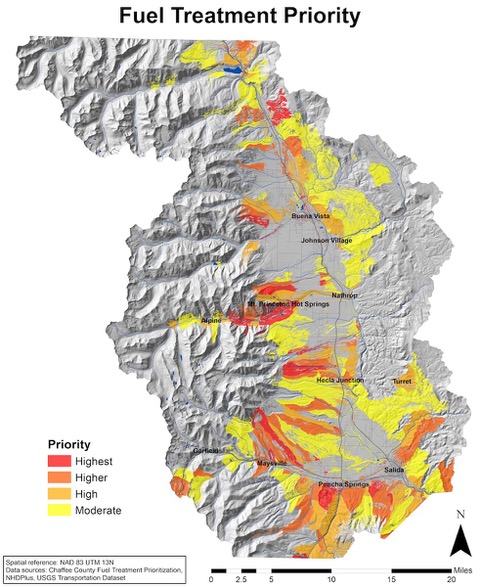Upper Arkansas Forest Fund $5.7 Million Award Used to reduce community wildfire risk in Chaffee County
With the U.S. Department of Agriculture (USDA) investment of $5.7 million in the implementation of Chaffee County’s Community Wildfire Protection Plan, progress is being made on the county’s forest treatment maps with the goal of reducing risk at the highest cost efficiency and community benefit.

A map created by the Forest Health Council showing the Chaffee County fuel treatment priority areas.
An alphabet soup of federal and state entities is involved, helping Chaffee County to reach the goal set by the Forest Health council, to treat 30,000 priority acres of forest by 2030 to cut the risk wildfire poses to community assets in half in a decade. Chaffee County’s wildfire plan prioritizes forest treatment areas and shows that cross-boundary work on public and private land are needed to meet this goal. One-third of Chaffee County’s identified treatment priority areas are privately owned.
The USDA funding was awarded at the end of Sept. by the USDA Natural Resources Conservation Service (NRCS) Regional Conservation Partnership Program (RCPP). This, in turn, flows into the National Forest Foundation (NFF) Upper Arkansas Forest Fund. The fund was created just this year, to aggregate finances and manage on-the-ground, cross-boundary projects designed by the Envision Forest Health Council to reduce risk as outlined in the community plan.
“Forests and watersheds are essential infrastructure that sustain our economy in Colorado. I’m thrilled USDA funding will support grassroots efforts in Chaffee County to reduce the risk of wildfires and protect this vital watershed that hundreds of thousands of Coloradans rely on,” said Colorado U.S. Senator Michael Bennet. “I’m committed to continue working with state, local and national leaders to secure additional resources to improve forest health across our state.”
NFF’s Upper Arkansas Forest Fund pools funds from federal programs, like the RCPP, and funds from the state, county, local governments, private companies, and citizens to accomplish cross-boundary work at landscape scale. Treatments include thinning trees, prescribed fire, and mastication — a patch-clearing method used in the piñon-juniper forest.
“Forest restoration treatments must be prioritized, accelerated and coordinated across boundaries to address the threat of wildfire effectively,” said Marcus Selig, Vice President of Field Programs for the NFF. “With support from the NRCS, the Upper Arkansas Forest Fund allows the NFF and the Chaffee County community to do exactly that as we collaborate to restore the highest priority private and public lands.”
Chaffee County was among 15 recipients of nearly $75 million in RCPP Alternative Funding Arrangements (AFA) for partner-led projects that address natural resource concerns on private lands.
“The AFA component of RCPP is designed for partners who are thinking outside of the box to address some of our most pressing natural resource challenges,” said Terry Cosby, Chief of USDA’s Natural Resources Conservation Service (NRCS). “By combining local expertise, partner resources, federal assistance and a shared commitment to conservation we can advance critical priorities and innovative solutions that are key to addressing the climate crisis.”
Reducing wildfire risk has been an ongoing goal for the Arkansas River Valley, long before the Decker Fire. Envision Chaffee County identified wildfire threat as a top concern during its 2017-18 community visioning and planning effort. The initiative facilitated the wildfire plan update in 2020, and it continues to help the Forest Health Council’s 35 partners design and fund a suite of programs and projects that implement the plan’s goals.
“It has been tremendously inspiring to see the many forest health partners come together in the basin for a common purpose,” said Chaffee County Commissioner Greg Felt, an Envision Co-lead and Forest Health Council member. “We are definitely achieving so much more together than we could as separate agencies. We are extremely grateful to the NRCS for recognizing our community as innovative.”
Council partners to-date have raised $11 million for projects that include a strategically placed fuel break on Methodist Mountain to protect the Salida and Poncha Springs communities of 7,000 people. Programs include Chaffee Chips, a wood slash removal service, and Chaffee Treats, which develops a pipeline of projects that connect large-scale private and public land treatments to be supported by the Upper Arkansas Forest Fund.
“The investment by NRCS in our community is the result of four years of engagement and unprecedented collaboration that really began when citizens identified wildfire as a top concern,” Envision Co-lead Cindy Williams said. “The award is a key milestone in realizing the vision of a fire-ready future.”








Recent Comments